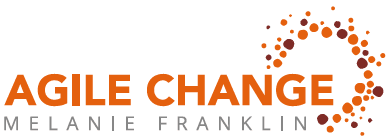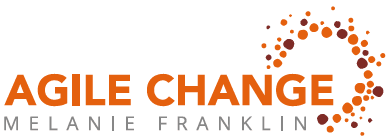Which course is right for me & my team
Agile Change Agent
Agile Change Coach
Change Management Practitioner
Neuroscience for Change
Agile Change Agent | Agile Change Coach | Change Management Practitioner | In-house training | ||||
|---|---|---|---|---|---|---|---|
What you learn | What it enables you to do | What you learn | What it enables you to do | What you learn | What it enables you to do | What you learn | What it enables you to do |
Differences between agile and waterfall approaches and the core concepts of agile change management | Use your knowledge of the benefits of agile change to gain the support of your stakeholders | Impact of the relationship between agile concepts and behaviour change | Explain to your stakeholders how an agile approach will impact your change initiative | Differences between tangible and behavioural change | Manage the expectations of stakeholders about the scale of the work required in change | Understanding the basics of how the brain works | Understanding how to apply the threat and reward responses to your change |
The value of each agile change concept and how they relate to each other | Explain the benefits of using an agile change approach to your stakeholders | Psychology and neuroscience for each step of behavioural change | Define measures to track and report the progress of your change | Theories that drive different preferences for participating in change | Build a menu of ways stakeholders can participate in your change | Understanding how the brain reacts to change | Identify and address the emotions triggered at each stage of the lifecycle of change |
The structure and processes for an iterative planning technique, using an agile roadmap | Apply the roadmap to your change initiative to create your own high level change plan | How to use the behavioural change lifecycle to create your change plan | Plan activities for each emotion generated during change | Theories of motivation | Decide what to emphasise to engage people in your change | Reducing the perception of pain | Using psychological safety and autonomy to increase engagement in the change |
Understanding the benefits of an evolving solution | Reassuring your stakeholders of the value of an incremental approach | The neuroscience behind our reactions to change
| Use a neuroscientific approach to more effectively influence and persuade your stakeholders | Organisational metaphors | Use the metaphors to define the scale of the change you are making | Increasing the pleasure generated by the change | Using celebration and belonging techniques to generate a positive response to change |
Prioritisation techniques | Applying these techniques to your change plan/roadmap | Apply portfolio management to create a holistic picture of all changes impacting your stakeholders | Reassure your stakeholders that you understand the pressures of undertaking multiple, simultaneous change | Theories of culture change | Ensure you have included all elements of cultural change in your change plan | Reducing the mismatch between reality and expectations | Using short planning cycles to reduce misunderstandings about the change |
Breaking your change into outcomes and capabilities it will deliver | Using these outcomes as the basis of your change plan/roadmap | Techniques for generating a “felt need” for change | Persuading your stakeholders of the relevance of your change to their work | Theories of planned and emergent change | Compare the theories and select the one appropriate to your change | Increasing the positive signals generated by the brain in response to change | Creating roadmaps and journey planners to explain how the change is managed |
Understanding the most critical pieces of information to explain your change | Defining your strategy for how you will manage your change | Techniques for establishing the benefits of the change | Enabling your stakeholders to identify benefits that are personally meaningful to them | Mechanisms for stakeholder analysis | Apply these models to identify and understand the relative importance of your stakeholders | Saving energy during the change | Using visualisations and routines to reduce the amount of energy needed to change |
Benefits identification techniques | Enable stakeholders to identify the benefits of change using simple, intuitive techniques | Positive psychology techniques to reframe negatives into positives | Overcome resistance to change by creating new perspectives | Impact and readiness assessments | Factors to identify the impact of your change and if there is willingness to change | Increasing energy to make the change happen | Using deadlines and anticipation to increase the energy people feel for the change |
Stakeholder analysis techniques to assess the needs and stresses of your stakeholders | Apply simple, intuitive techniques to build empathetic relationships | Motivational techniques to encourage participation in the change | Energise stakeholders to want to participate and make the change a reality | Types and causes of resistance to change | Factors that drive resistance and ideas for how to address them | Managing peaks of adrenaline | Increasing curiosity about the change to create energy for the change |
Applying the factors of effective agile leadership | Collaborate via credible and trusting relationships | Techniques to identify and celebrate progress | Apply the neuroscience of achievement to create resilience | Levers for change | Identify encouragements and nudges that will help embed your change | Promoting valleys | Applying mindfulness techniques to create rest and recovery |
Agile Change
Agent
If you want to break your change into a series of agile iterations, prioritising your work by the value it delivers for the business, this is the course for you.
- Bite-sized pieces of common sense
- Scope and plan your change initiative
- Use simple, intuitive techniques to identify benefits of your change
- Work collaboratively with project teams and staff impacted by the change
Agile Change
Coach
If you want to use neuroscience to get people enthusiastically taking part in your change, practising and adopting new ways of working, this is the course for you
- Fast track your knowledge of neuroscience
- Practical techniques for generating trust and empathy
- Analyse what you say to increase your persuasiveness
- Learn techniques to increase your resilience
Change Management
Practitioner
If you want to formalise your knowledge of change management, and build a foundation of expertise that will last a lifetime, this is the course for you
- Build a solid foundation of change management knowledge
- Benchmark your experience against famous theories and models
- Increase your confidence by knowing what others know
- Build your credibility with globally recognised qualifications
Neuroscience for Change
We all have brains, so doing work and creating communications that are brain smart have an immediate impact on our effectiveness. This course is for everyone, because what you learn applies to your work and home life.
You will learn:
- How to reduce the pain of change
- Designing changes that our brains can easily understand and participate in
- How to build our resilience to cope with change
- How to create energy and motivation for change

Play Video
Melanie as a trainer
Melanie has a unique profile as she delivers high impact training alongside her active Consulting and leadership roles. This ensures that each course is delivered with passion, energy and focus that only a true practising professional can offer.
By incorporating latest innovations and practical techniques to the accredited qualifications, delegates obtain both a qualification as well as technical skills that enable immediate use of the learning in an operational environment.
Reviews
Feedback from some happy customers
Change Management delegate gives personal feedback
Senior Programme Manager gives feedback on Change course
Sam provides feedback on Agile Project Management course

